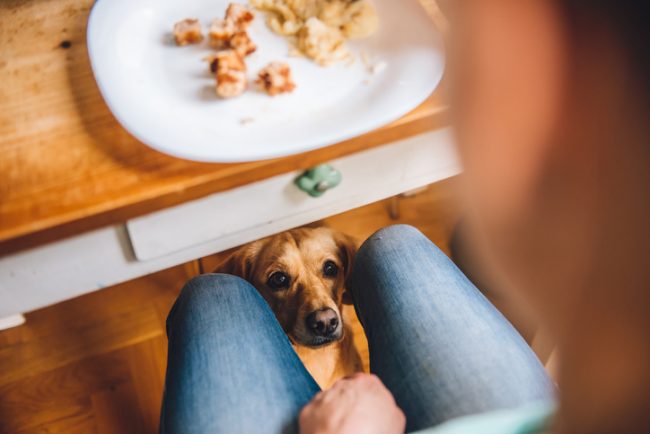Although it may be tempting to offer your beloved pet table scraps, some human foods can be hazardous to our furry and feathered friends. So, before you give your Chihuahua the last bite of your cheeseburger, take a peek at our handy list of potentially toxic foods for pets.
Call your vet or the Animal Poison Control Center (888-426-4435) immediately if you suspect your precious pet has consumed any of the following 12 foods or beverages.
1. Alcohol
It may seem like a no-brainer, but don’t ever serve your furbaby beer, wine, whiskey or other alcoholic beverages. Doing so can result in a plethora of potential problems, ranging from diarrhea and vomiting to coma and even death.
2. Avocado
This popular fruit may be packed with healthy monounsaturated fatty acids, but think twice before giving it to your pet. It contains a toxin called persin, which can be especially harmful to birds and horses. There is much dispute over the safety of avocado for dogs and cats. However, at the very least, the pit of the fruit can present both a choking hazard and obstruction risk.
3. Caffeine, chocolate and coffee
These are some of the most popular substances known to man, but they aren’t a wise choice for man’s best friend. All three contain methylxanthines, which can cause diarrhea, vomiting, tremors, seizures and other symptoms—including death—in pets. Note that the lighter the chocolate, the less harm it poses to your adorable animal. Therefore, white chocolate is safer than baking chocolate.
4. Chives, garlic and onions
We humans can’t get enough of these flavorful herbs and veggies! However, they can cause significant gastrointestinal irritation and damage to red blood cells in pets—especially cats. Dogs who consume large amounts chives, garlic and/or onions are also at risk of experiencing these symptoms.
5. Citrus
No lemons for your labradoodle! The stems, leaves, fruit, seeds and rinds of citrus plants all contain citric acid, an essential oil that can be harmful to pets. Consuming a small amount of citrus (e.g., the fruit), can cause minor stomach upset whereas consuming a large quantity (e.g., the rind, fruit and seeds) can cause irritation and depression of the central nervous system.
6. Coconut and coconut products
Small amounts of coconut or coconut products are unlikely to seriously harm your pet. However, fresh coconut milk and flesh contain oils that can cause stomach upset, loose or runny stools and diarrhea. Therefore, it’s best to refrain from offering your four-legged family member a taste of the tropics.
7. Dairy
Unfortunately, pets don’t possess much lactase (an enzyme that helps breaks down lactose in milk). That means excess consumption of milk and other dairy products can cause gastrointestinal symptoms, such as stomachache and diarrhea. Small amounts, however, may be tolerated.
8. Grapes and raisins
As yet unidentified substances in grapes and raisins can be deadly to dogs. Until more information is available, save these sweet treats for the humans in your life.
9. Nuts
Nuts and pets generally don’t mix. Varieties, such as almonds, pecans and walnuts, are high in oil and fats, which can trigger diarrhea, vomiting, and even pancreatitis in animals. Macadamia nuts, in particular, can cause depression, vomiting, weakness, tremors and hyperthermia in dogs.
10. Salt
Too much salt can cause excessive thirst and urination, and even sodium ion poisoning, in our furry friends. Signs that your prized pet may have OD’d on salty snacks include depression, diarrhea, vomiting, tremors, raised body temperature, seizures and death. Therefore, try to limit or, better yet, avoid feeding salty favorites, like popcorn, pretzels and potato chips, to your pets.
11. Xylitol
This sweetener, found in many products, such as candy, gum and toothpaste, can spell danger for many species. Even small amounts can cause low blood sugar (hypoglycemia), seizures, liver failure and death in dogs.
12. Yeast dough
Bakers beware as yeast dough can rise, causing an accumulation of gas in your pet’s digestive system! This can lead to pain and stomach bloating, and the stomach can potentially twist—a life-threatening condition. In addition, a dog who ingests raw bread dough may become drunk off of the ethanol (a by-product of yeast), leaving him or her susceptible to all the potential dangers of alcohol consumption (see above).
What can you feed your pet?
At this point you may be wondering which “people foods” are safe to feed your pets. The following are acceptable, when consumed in moderation. And always keep an eye out for signs of an allergic reaction.
- Apple slices (no seeds or core)
- Carrots
- Cheese (low fat, small amount)
- Chicken
- Corn (removed from cobb)
- Eggs
- Fish
- Oatmeal (plain, no added sugars)
- Peanuts/peanut butter (raw, unsalted, no artificial sweeteners)
- Pumpkin
- Sweet potatoes
- Tuna
- Turkey
- Yogurt (low fat, small amount, no artificial sweeteners)

